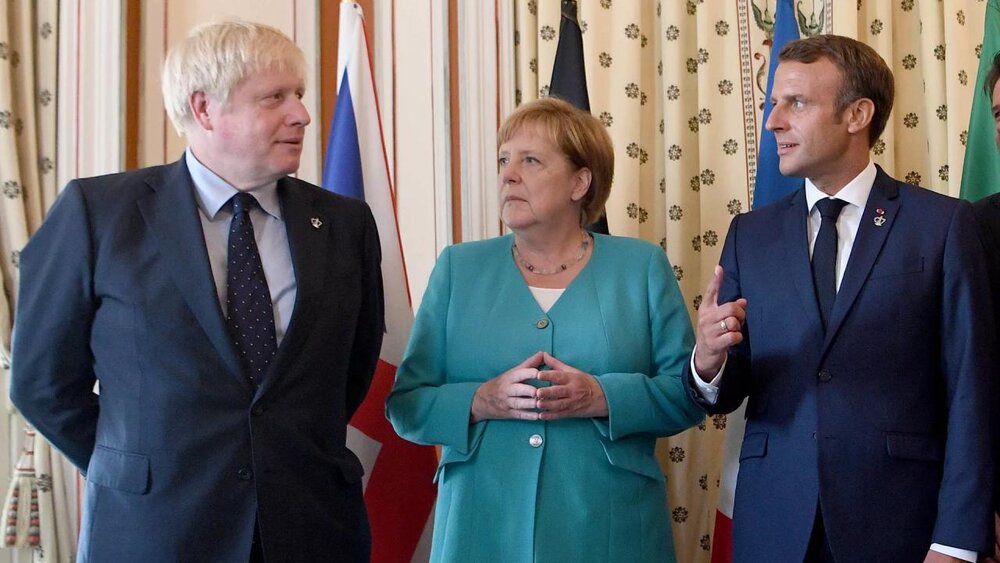U.S. may blackmail JCPOA parties into overlooking snapback of UN sanctions

TEHRAN- The U.S. push to force a return of international sanctions on Iran was met with strong opposition from the international community, a move that could prompt the U.S. to use blackmail against parties to the 2015 Iran nuclear deal.
The U.S. diplomatically explosive decision to demand a snapback of all UN sanctions on Iran sent shockwaves across the world, prompting a diplomatic backlash against the U.S. unilateralism at the UN Security Council.
Parties to the nuclear deal, officially known as the Joint Comprehensive Plan of Action (JCPOA), rejected the U.S. move with one voice, declaring that the U.S. had no right to notify the Security Council of Iran’s “significant non-performance” as defined in the UN Security Council Resolution 2231, which was adopted in 2015 to endorse the JCPOA.
“France, Germany, and the United Kingdom (“the E3”) note that the US ceased to be a participant to the JCPOA following their withdrawal from the deal on May 8, 2018. Our position regarding the effectiveness of the US notification pursuant to resolution 2231 has consequently been very clearly expressed to the Presidency and all UNSC Members. We cannot, therefore, support this action which is incompatible with our current efforts to support the JCPOA,” the E3 foreign ministers said in a joint statement on August 20, moments after the U.S. sent a letter to the Security Council demanding to initiate the “snapback” mechanism, which allows a participant to the JCPOA to seek the re-imposition against Iran of the multilateral sanctions lifted in 2015 in accordance with resolution 2231.
Similarly, EU High Representative Josep Borrell, who is also the coordinator of the Joint Commission of the JCPOA, said that the U.S. has “ceased participation” in the nuclear deal, and thus it cannot trigger the snapback mechanism.
“As I have repeatedly recalled, the US unilaterally ceased participation in the JCPOA by presidential Memorandum on 8 May 2018 and has subsequently not participated in any JCPOA-related activities. It cannot, therefore, be considered to be a JCPOA participant State for the purposes of possible sanctions snapback foreseen by the resolution,” Borrell said in a statement on Thursday.
Russia and China also strongly opposed the U.S. measure, saying the U.S. had no legal authority to initiate the snapback mechanism.
“The U.S. demand has no legal ground and common sense. It is nothing but a political show staged by the United States. It receives no support of the Security Council members and no acknowledgment of the international community,” Chinese permanent mission to the UN said in a statement.
The statement also said, “Having quit the JCPOA, the United States is no longer a participant to the JCPOA and has no right to demand the Security Council invoke a snapback as stipulated in Resolution 2231.”
Russia called the U.S. move “a big mistake which can have extremely negative implications” and vowed to challenge it.
In a tweet on Thursday, Maria Khrenova, the TASS news agency correspondent at the United Nations, said that Russia will challenge the U.S. push to trigger the snapback of the UN sanctions. Her tweet was retweeted by Mikhail Ulyanov, the permanent representative of Russia to international organizations in Vienna.
“Our position and not just ours is that [the] U.S. doesn’t have legal right or reason to initiate this thing. Of course, we will challenge it,” Khrenova quoted Russia’s Ambassador to the UN Vasily Nebenzya as saying.
The opposition to the U.S. measure was not limited to the JCPOA parties. Others also opposed it.
“For Belgium, the case is crystal clear: the USA cannot trigger a snapback of sanctions through the JCPOA since it ‘ceased its participation’ to the JCPOA in May 2018,” The Belgium mission to the UN said in a tweet.
Facing a global backlash against its measure, the U.S. seems to be on a collision course with the international community over the triggering of the snapback mechanism, with little or no support from its closest allies on the other side of the Atlantic Ocean.
In light of this backlash, some experts and former officials of the Trump administration began a tit-for-tat approach toward Washington’s European allies after they refused to support the U.S. request for the snapback mechanism.
“One positive outcome from the French decision to ignore the plain text of a Security Council Resolution and try to strip its ally of its P5 rights: no longer must anyone at @StateDept play nice on France’s request to renew the mandate for the @UNIFIL_ billion dollar boondoggle,” tweeted Richard Goldberg, the former official at Donald Trump’s National Security Council.
The mandate of the United Nations Interim Forces in Lebanon (UNIFIL) expires on August 31. The UN is considering the idea of extending the mandate of UNIFIL in Southern Lebanon. French and Lebanese officials have exchanged views on the issue in recent days. While France supports extending the mandate of the UNIFIL forces, some experts in Washington make the case for reforming or even ending the operation of the UNIFIL forces.
Goldberg called for punishing France by vetoing the extension of the UNIFIL mandate if it opposed the snapback. Similarly, he called on the U.S. to cut foreign aid to countries standing up against the U.S. at the Security Council.
“Burying the lede: ‘The United States will be carefully watching, and remembering, which of our partners and allies stand with us.’ Recipients of US foreign aid on UNSC include: Indonesia, Estonia, Tunisia, Vietnam, Niger, South Africa. UK wants FTA [free trade agreement]. France wants UNIFIL mandate,” the former official tweeted.
The U.S. has yet to announce how it would force other countries to give up on the snapback. Whether it would take note of Goldberg’s extortion advice remains an open question. But the U.S. may resort to blackmailing the remaining JCPOA parties given the sweeping opposition to its gambit at the Security Council.
Leave a Comment